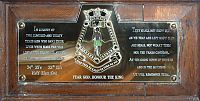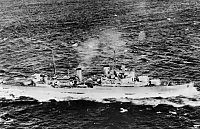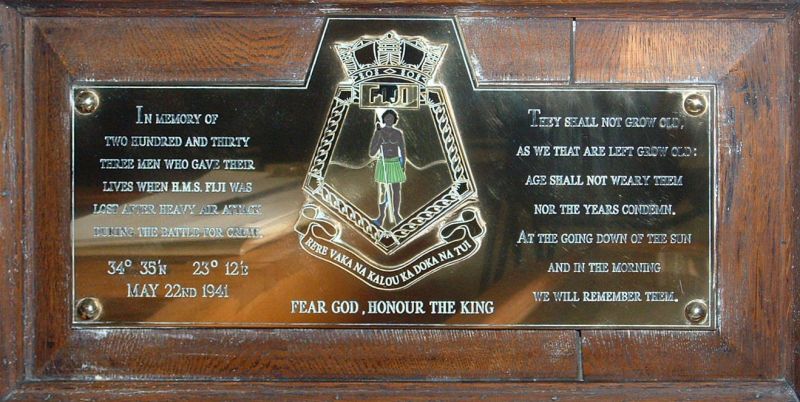Location
On the south wall of the Navy Aisle (see Cathedral Plan).
Description
The brass plaque measures 375mms wide x 170mms high.
In memory of
Two hundred and thirty
Three men who gave their
Lives when HMS FIJI was
Lost after heavy air attack
During the Battle for Crete
34o35N 23o12E
May 22nd 1941
(Centre)
Fear God Honour the King
(Right)
They shall not grow old
As we that are left grow old
Age shall not weary them
Nor the years condemn
At the going down of the sun
And in the morning
We shall remember them.
Further Information
Wikipedia
U-Boat.net
Naval History website
HMS Fiji Association
The Story of Leading Seaman Walker
The names of those who lost their lives as a consequence of the action are listed below. The names have been compiled from a variety of sources, and largely confirmed by the Commonwealth War Graves Commission, though the total number (251) differs somewhat from the number quoted on the memorial. All of the names can be found at www.cwgc.org.
A 65th Anniversary poster can be downloaded at http://www.cdcinsurance.ca/images/hmsfijicommemoration.jpg
Crew of HMS Fiji Lost at Sea, 23rd May 1941 - Commemorated on the Portsmouth Naval Memorial
|
ALLAN, HENRY HORRICKS, P/KX 81997 |
LAMBOURN, ALBERT EDWARD JAMES, P/KX 79947 |
Crew of HMS Fiji Lost at Sea, 23rd May 1941 - Commemorated on the Plymouth Naval Memorial
|
BROWNE, WILLIAM STAVELY, D/SSX 35782 |
HOLDEN, ARTHUR, D/SSX 31421 |
Crew of HMS Fiji Lost at Sea, 23rd May 1941 - Commemorated on the Chatham Naval Memorial
|
BELL, ALLEN NORMAN, C/JX 217020 |
PARSONS, CHARLES EDWARD, C/JX 215257 |
Crew of HMS Fiji, Died/Injured 23rd May 1941, Buried ashore
|
BULL, ALFRED JAMES, P/KX 79104, Alexandria (Hadra) War Memorial Cemetery. Grave No. 2.C.5 |
Download a spreadsheet, as supplied by the CWGC, containing all but two of the names above (Robert Mills and Lawrence Weston were canteen assistants and not considered members of the Royal Navy).
The following is a personal account written by Norman Lewis, who served aboard HMS Fiji as a 18/19 year old musician from Gosport and who survived the sinking of HMS Fiji. It is an edited extract from Norman's autobiography which can be downloaded below.
"A Musician and a Steel Box"
I celebrated my 18th birthday quietly in North Barracks, Deal, Kent, the Headquarters of the Royal Naval School of Music, a branch of the services not known by many folk and, because we were dressed as Royal Marines, we were accepted as Marines. This was most confusing and often those who should have known better, addressed us as such.
The Royal Marine Bands were mainly shore based, and rarely served on RN Ships. The RNS of M served on all the major ships from Battleships to cruisers and it is recognised that, percentage wise, this small, music making unit, lost more men than any other branch of the services.
The Steel Box played another very important part of a bandsman's life aboard ship and was largely responsible for the loss of so many men, some of whom were my friends. This box, to which I refer, was the Transmitting Station (TS) situated in the bowels of the ship and usually surrounded by fuel tanks. To get to the upper deck from this box, meant climbing three, four, five ladders, at the top of which, was a hatch cover. This had to be opened and sometimes this cover would jam and I leave the reader to imagine -- if you can, what this meant?!!!!!!!!!!!!!
"The box" was the bands Action Station and consisted what must have been very, very early computers. Largebox-like structures on which all information for the guns was calculated as it was received, and entered on to the calculators. When this info was complete it would be sent to the guns and, when ready, the Gunnery Officer would signal Fire!!!!!!!!!.
Not much later than my birthday my name appeared on the notice-board with fourteen others who were to form the band for HMS Fiji which was launched by a relative of Princess Diana, in 1939, at John Brown's yard on the Clyde. She was commisioned in February of the following year and after a short period doing trials, she made her way to the West Indies to continue this "Working up" as it was called, at the same time keeping a watchful eye out for surface raiders. This meant the band spent hours in that steel box assuring we knew everything necessary to operate the TS correctly if and when the time arose to go into action. We sailed south to patrol around the French Island of Martinique, should the French capitulate.
Back in England, and now ready to join the fleet, Fiji was given the task of escorting troopships to Dakar in East Africa and, when well out in the Atlantic, was hit by a torpedo in the boiler room beneath the Marine's messdeck. This meant we could not return to the mess and had to use the hanger for the trip back to the Clyde. Luckily, she stayed afloat and during those three days Mark Edwards, a brilliant music maker, did a wonderful job entertaining the lads. This event was, indeed, a close shave!!!!!!!!
On leave and leaving the cinema one late afternoon with my then girl friend, we stopped to chat with friends about the film and moved to walk the rather long and straight road home, when out of the clouds came the plane, swooping low and machine gunning as he came towards us. We both threw ourselves into a shop doorway, unscathed! The second lucky escape!!
We were asked if the band would return to Fiji after the repairs had been completed. The reason was, that we were competent in the TS and another band would have to start from scratch. With the exception of the bandmaster, we returned in February 1941. During our time away from Fiji, the band was deployed to HMS Dolphin, the submarine bass in Gosport and, as this was my home town, I was uphomers--living mostly at home-- and my mate, Doug Elmer was made welcome too. Here at Dolphin, we entertained the submariners almost every day. It was richly deserved and I would not wish to change places.
Back aboard Fiji with our New Bandmaster, Ron Wenham, a real gentleman and our first task was to escort convoys half-way to the UK when other escorts took over and we returned to our base at Gibraltar where our stay was short lived as Fiji was to find herself entering a dangerous war-zone as she joined a convoy, with others to Malta, and it was on this trip we experienced our first air attacks by Italians and then by both Italians and Germans. On this occasion the TS was to be our home for most of the time with short breaks to wash and eat and perhaps, if one was lucky, have a breath of fresh air. The convoy reached Malta having received some damage. Fiji continued East, onward to Alexandria at the head of the Suez canal. We refueled etc and soon were on our way to Suda Bay, N. Crete travelling at speed which causes the bow-- the front-- to vibrate - very uncomfortable and that is where the soldiers we were carrying, were billeted. Many were very sea-sick and said they were land based and not sailors. They wished, I'm sure, that they were still in the desert. Little did they know what lay ahead. Fiji arrived at the Bay late at night. The troops disembarked and we sailed away to search for German troop barges which were attempting to land in N. Crete. Other ships were also patrolling the channel between Greece and Crete with some success.
Fiji was recalled to join the fleet to the SW of Greece and this gave the lads of the band, the chance to have a break from the TS, enjoy the luxury of a decent meal and shower. Unfortunately, these luxuries were short lived.
Early on the morning of May 22nd Fiji and then Gloucester were dispatched to go to the assistance of HMS Greyhound in trouble to the SE of Greece whilst hunting down those barges. She had received severe damage and we were going to help but, by the time we arrived, she was sinking and went down very quickly. We were recalled to rejoin the fleet but, as we had been fighting off continous air attacks all that day, both ships were in deep trouble as their ammuniton was almost exhausted. Stuka dive bombers were like bees round a honey pot and at about 1700 when we were off the SW coast of Greece, Gloucester received serious damage came to a halt and disappeared about 1700. Her crew, being machine gunned as they swam and consequently her casualties numbered more than 800. The few who survived were POW for some four years. As Gloucester was going down, Fiji steamed close by, dropping her life rafts, with the hope lives would be saved and, this action has been recognised as an act of true unselfishness and brotherly love for ones mates, as we were all in this together.
Fiji turned south towards the SW of Crete with the hope of escaping the incessant air attacks and thought she had succeeded. Cetainly, she was out of range of the Stuka bombers and we thought our luck was in and that we were safe at last, but how wrong can one be? Out of the clouds, and swooping low, came a loan German bomber which dropped three bombs, two of which hit Fiji whilst the third blew in the ship's side causing a dramatic list to Port.
We, in the Steel box, were waiting with some anxiety for the Abandon Ship! and at about 1910 it came. The climb up those ladders, by now at a very steep angle, made climbing difficult but, we all made the upper deck thankful those hatch covers opened without problems.
My mate, Doug and I made our way aft --the back end-- seeing for the first time the devastation up there and many of our ship-mates who would not return home again to be with their love ones. Other pictures of human destruction I could not possibly describe.!!!
To reach the water, one had to walk down the sloping side of the ship and when one thought it safe to do so, jump!! This we did and swam away from the ship. The rafts had been thrown to the crew of Gloucester so nothing to hang on to. We did wear life belts and they proved to be life savers.
The sun went down, so we were left in the dark and I don't recommend this time of day to swim. Eventually, we saw what we thought was a torch light and it proved to be that of the destroyer HMS Kandahar which had returned to pick up survivors. We two were hoisted aboard just after 0100 having spent some five hours in the, by now, chill waters some 20 miles SW of Crete. We were given a tot of neat rum which we had to drink, then taken down to the mess deck where there were bodies everywhere trying to sleep and very, very quiet. We only had what we were wearing that day and it was soaking, but the rum helped to warm us through.
In total, that day, Fiji and Gloucester lost over 1000 men and boys which could have been avoided if those in Whitehall had listened to the Admiral's advice. This was ignored and, as a result, many families would receive that dreaded telegram, "We beg to inform you!"
Our days in the Steel Box and our music making were over until we arrived home in mid August as we sailed into Liverpool aboard the SS Empress of Australia.
Some days later, clad only in shirt, trousers and canvas slippers we arrived at the RM Barracks in Plymouth to be confronted by the Sergeant of the guard who went beserk when he saw us, and raved about being improperly dressed and did'nt want to listen to our reasons for our dress. Asking if we could go to the pub along the road to celebrate our safe return home his answer, "Certainly not, dressed like that! "That pub, during an air raid that evening received a direct hit. Another close shave for which we should give thanks and, believe me, we did!!!! I'm sure someone up there was watching over us! Thank you!
Some have asked if I would have chosen a different life, given the chance? I chose to spend those years making music with the RNS of M and thoroughly enjoyed every musical moment. I met and made many lifelong friends some still going strong today. One lived almost on my doorstep and some of you oldies out there may remember the late Jan Hine--percussionist--good mates for 50 years and now Jean, his wife, who has been, also, a lifelong friend and we see each other regularly to this day.
The down side obviously was the war, but even that had its blessings as we faced each day together, showing there is a brotherly love out there when faced with adversity. This was certain aboard all other ships on which I served. My next ship in 1942, was HMS Anson, where we did the Russian Convoy run for three years and where much of the time was spent in that Steel Box, but that is another story.
This story I Dedicate to all those men of the RNS of M who did not return home to their loved ones. May the Good Lord watch over and bless them all!
Norman Lewis
"God bless you all"
[Download the full autobiography]



